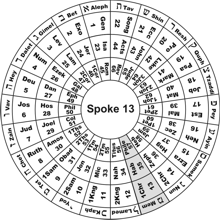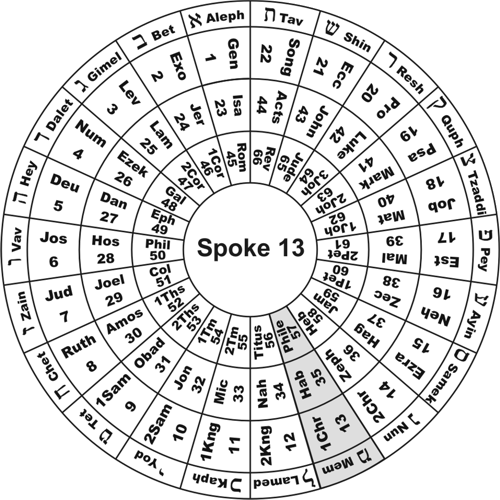From the Waters of Judah
So all Israel were reckoned by genealogies; and, behold, they were written in the book of the kings of
Israel and Judah, who were carried away to Babylon for their transgression.
1 Chronicles 9:1 (Spoke 13, Cycle 1)
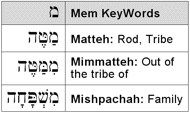 The Book of 1 Chronicles opens with nine chapters of genealogies from Adam to Zechariah. This is far
and away the largest genealogical list in the Bible, filling 421 of its 942 verses, or 44% of the text.
Given the meaning of Mem as the sign of origin and source,
this unique and distinguishing characteristic of
the Thirteenth Book exposes yet another extremely obvious and astounding integration of the Bible on the pattern of
the Hebrew Alphabet. Nestled
within the sixth chapter of the genealogies, we find a repetition of the distribution of cities amongst the twelve
tribes originally recorded in Joshua. Here is a representative sample, where every occurrence of "out of the tribe of"
is a translation of mimmatteh, formed by prefixing a Mem to the KeyWord matteh: The Book of 1 Chronicles opens with nine chapters of genealogies from Adam to Zechariah. This is far
and away the largest genealogical list in the Bible, filling 421 of its 942 verses, or 44% of the text.
Given the meaning of Mem as the sign of origin and source,
this unique and distinguishing characteristic of
the Thirteenth Book exposes yet another extremely obvious and astounding integration of the Bible on the pattern of
the Hebrew Alphabet. Nestled
within the sixth chapter of the genealogies, we find a repetition of the distribution of cities amongst the twelve
tribes originally recorded in Joshua. Here is a representative sample, where every occurrence of "out of the tribe of"
is a translation of mimmatteh, formed by prefixing a Mem to the KeyWord matteh:
And to the sons of Gershom throughout their families out of the tribe of Issachar,
and out of the tribe of Asher, and out of the tribe of Naphtali,
and out of the tribe of Manasseh in Bashan,
thirteen cities. Unto the sons of Merari were given by lot, throughout their families (mishpachah),
out of the tribe of Reuben, and out of the tribe of Gad, and out of the tribe of Zebulun, twelve cities.
1 Chronicles 6:62ff (Spoke 13, Cycle 1)
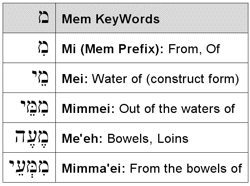 The
placement of these genealogies in the first Book on Spoke 13 further coheres with water as a symbol of people.
God used it this way when He spoke of His people as coming "out of the waters of (mimmei) Judah" (Isa 48:1).
Some textual critics see this is an unusual construct that should be read as the more common mimma'ei,
"from the bowels of,"
especially since this word appears in the next chapter: The
placement of these genealogies in the first Book on Spoke 13 further coheres with water as a symbol of people.
God used it this way when He spoke of His people as coming "out of the waters of (mimmei) Judah" (Isa 48:1).
Some textual critics see this is an unusual construct that should be read as the more common mimma'ei,
"from the bowels of,"
especially since this word appears in the next chapter:
The LORD hath called me from the womb; from the bowels of (mimma'ei) my mother (em)
hath he made mention of my name.
Isaiah 49:1
Regardless of the correct reading, it is evident that the KeyWords mei (water of) and
ma'ei (bowels of) have a natural overlap in meaning. They are similar concepts that go together.
The "bowels" represent the "watery" part of a person, such as a mother's womb:
By thee have I been held up from the womb (mibbeten): thou art he that took me
out of the bowels (mimma'ei) of my mother (em): my praise shall be continually of thee.
Psalm 71:6
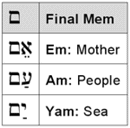 This
verse exemplifies 1) the Mem Prefix, 2) the parallelism of womb
and bowels, and 3) the word mother (em), spelt Aleph Mem. It is really just a
vocalization of this Letter, not dissimilar to the words for people (am) and sea (yam).
These words confirm and reiterate symbolic relation between water and people. Variations on the Hebrew em (mother)
are nearly universal throughout the world's languages, such as ma, mama, mom, mum, imma, amma.
This points to Hebrew as the primordial language of the whole human race because it is only in
Hebrew that we see the intrinsic coherence of this mama word with the literal meaning of Mem as
water and its grammatical role as the sign of the preposition from. For what is a mother but
she from whom we all come? And how do we come but through water?
We all floated for nine months in the amniotic sac, and when the water broke, we were born into this world.
Many commentators believe that Christ spoke of this in John 3:5: This
verse exemplifies 1) the Mem Prefix, 2) the parallelism of womb
and bowels, and 3) the word mother (em), spelt Aleph Mem. It is really just a
vocalization of this Letter, not dissimilar to the words for people (am) and sea (yam).
These words confirm and reiterate symbolic relation between water and people. Variations on the Hebrew em (mother)
are nearly universal throughout the world's languages, such as ma, mama, mom, mum, imma, amma.
This points to Hebrew as the primordial language of the whole human race because it is only in
Hebrew that we see the intrinsic coherence of this mama word with the literal meaning of Mem as
water and its grammatical role as the sign of the preposition from. For what is a mother but
she from whom we all come? And how do we come but through water?
We all floated for nine months in the amniotic sac, and when the water broke, we were born into this world.
Many commentators believe that Christ spoke of this in John 3:5:
Verily, verily, I say unto thee, Except a man be born of water and of the Spirit,
he cannot enter into the kingdom of God. That which is born of the flesh is flesh; and
that which is born of the Spirit is spirit.
John 3:5
The parallelism of "born of water" and "born of the flesh", coupled with Nicodemus' confusion about entering a
"second time into his mother's womb," has led many to conclude that "born of water" refers to natural birth.
Others see it as a reference to water baptism which represents our birth into God's Kingdom.
Given the multifaceted Wisdom of God, I see no reason it could not mean both.
| 